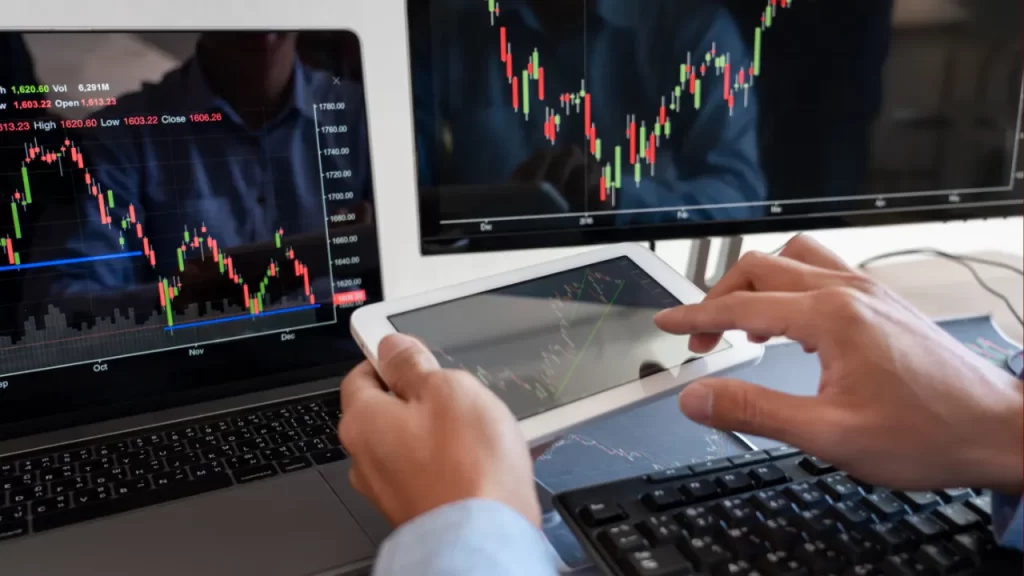As a new trader in South Africa, you might wonder how CFD brokers stay in business—especially when many offer commission-free accounts or allow you to start trading with low capital.
Understanding how CFD brokers make money is an important step in becoming a more informed, confident trader.
In this article, we explain how CFD brokers earn revenue, the fees you should be aware of, and how different broker models affect your trading experience.
What Is a CFD Broker?
A CFD broker is a financial services provider that gives you access to the markets through Contracts for Difference (CFDs).
When you trade CFDs, you’re not buying the underlying asset—you’re speculating on its price movement.
The broker facilitates this transaction and provides the trading platform, market access, and necessary infrastructure.
The Main Ways CFD Brokers Make Money
1. Spreads
The spread is the difference between the buy price (ask) and the sell price (bid) of an asset.
For example, if the buy price of gold is R2,000 and the sell price is R1,998, the spread is R2.
This difference represents a cost to the trader and a source of income for the broker.
Most brokers advertise low or tight spreads, especially on popular markets like major forex pairs or stock indices.
However, during times of high volatility or low liquidity, spreads can widen.
2. Commissions
Some CFD brokers charge a commission on trades, especially when offering raw spreads or access to specific instruments like shares. For example, a broker might offer near-zero spreads on forex pairs but charge a fixed commission per trade or per lot.
This model is more common with ECN (Electronic Communication Network) or STP (Straight Through Processing) brokers, who provide direct market access.
3. Overnight Financing Fees (Swap Fees)
When you hold a CFD position overnight, your broker may charge a financing fee, also known as a swap.
This fee reflects the cost of borrowing the leveraged amount used to maintain the position.
The overnight fee is usually calculated based on the size of your position and the interest rate differential between the currencies in a pair (in forex), or a fixed percentage for other instruments.
Some brokers offer swap-free accounts, but they may adjust this by charging other administrative fees.
4. Inactivity Fees
Some brokers charge an inactivity fee if your account remains idle for a certain period, typically between three to twelve months.
This fee is deducted from your account balance and encourages active trading.
Not all brokers apply this fee, but it’s something to check in the broker’s terms and conditions before signing up.
5. Currency Conversion Fees
If your trading account is denominated in a currency different from the asset you’re trading, a conversion fee might apply.
For example, if your account is in ZAR but you’re trading a US stock CFD, your broker may apply a conversion rate and fee.
6. Markups on Market Prices
Some brokers operate as market makers, meaning they may quote their own prices rather than directly passing through interbank rates.
In these cases, they may add a small markup to the spread, which becomes a source of profit.
While this can seem like a disadvantage, market maker brokers can also offer features like guaranteed stops and fixed spreads, which can benefit beginner traders.
Broker Models and Their Impact on Profit Structure
There are two main types of CFD brokers: dealing desk (market maker) and non-dealing desk (STP/ECN).
A market maker broker takes the other side of your trade and may profit from your losses. However, this doesn’t mean they manipulate trades.
Reputable market makers are regulated and follow strict protocols.
An ECN or STP broker connects you to liquidity providers and typically earns from commissions and spreads without taking positions against you.
Both models are legal and regulated in South Africa, but they operate differently. Understanding the broker’s model can help you decide which is more suitable for your trading style.
Are There Hidden Fees?
Legitimate CFD brokers are required by regulators such as the FSCA (Financial Sector Conduct Authority) to disclose all fees clearly.
While fees may not always be obvious upfront, they should be visible in your trading platform, account documents, or product disclosure statements.
Before opening a live account, always check:
The fee schedule on the broker’s website
Terms and conditions for inactivity or withdrawal fees
Live or demo trading platforms to monitor real-time spreads and swaps
Final Thoughts
CFD brokers make money in a variety of ways, including spreads, commissions, overnight fees, and other administrative charges. These costs are part of the service they provide—giving you access to global markets, trading platforms, and real-time data.
For South African traders, it’s important to choose a broker that is transparent about its fee structure, regulated by the FSCA, and aligned with your trading needs.
Before committing to a broker, compare offerings, test demo accounts, and explore broker reviews on Solis Markets Hub—your reliable source for trading insights, platform guides, and broker evaluations tailored to the South African market.






